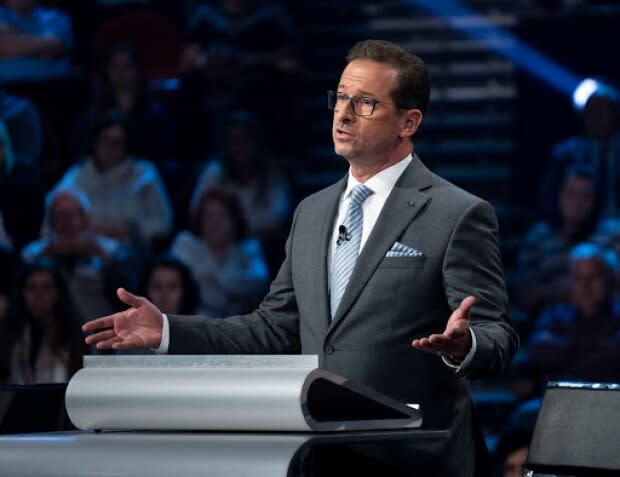The Legault factor: How Quebec's premier is influencing the federal election campaign
At the outset of the federal election campaign, Premier François Legault gave strict marching orders to his party: don't get involved.
It was decreed that no minister, no backbencher, not even riding office staff, would be allowed to stump for a federal candidate, let alone weigh in on a federal issue.
In explaining his decision, Legault said he didn't want to risk alienating whichever party forms the next government.
These rules, apparently, did not apply to the boss.
Prime Minister Justin Trudeau had barely left Rideau Hall on Sept. 11 when Legault was clashing with the Liberal leader.
After asking the Governor General to dissolve Parliament, Trudeau gave a news conference during which he was peppered with questions in French about Quebec's secularism law.

The law, also known as Bill 21, bars public school teachers and other civil servants from wearing religious symbols at work. Its constitutionality is being challenged in court — opponents say it discriminates against minorities — and Trudeau was asked whether he thought the federal government should join the lawsuit.
That would be "counter-productive," Trudeau replied. But he added a proviso, "for the moment."
In Quebec City, hours later, Legault barreled into a scrum of journalists and made it clear that he was displeased with Trudeau's comments. He wanted the federal leaders to commit to staying out of the court challenge forever.
"I'm asking all federal parties to make sure, and to assure the population of Quebec, that they won't participate in any lawsuit against Bill 21," Legault said.
From that moment onward, the law has been one of the dominant themes of the campaign.
Like the environment or the economy, it was discussed at all four debates. And regardless of where they are in the country, the party leaders are asked about it, in both official languages.
If this state of affairs is partly Legault's own doing, then so too is the volatile electoral situation it has generated.
By insisting that federal leaders steer clear of his controversial law, Legault created the conditions for the Bloc Québécois's resurgence.
In the process, the outcome of Monday's election has become unpredictable.
Casting doubts
From a strictly legal perspective, there is no obvious reason why Bill 21 should be the subject of so much discussion in a federal election campaign.
It's provincial legislation, after all, and its future will be decided by the courts, not federal politicians.

The only concrete policy difference among the federalist parties is whether they would seek intervener status in a court case. The Liberals say maybe; the Conservatives, NDP and Greens say no.
Intervening, despite what the word invokes, doesn't mean the government is tipping the scales of justice in its preferred direction. It simply means its lawyers are allowed to provide additional arguments.
As others have pointed out, Ottawa has done this many times, only to see the courts favour the other side, including in the 1988 Morgentaler decision and, more recently, upholding Quebec's succession law.
Legault has made it clear he doesn't want federal politicians campaigning on their opposition to the law.
But in doing so, he has made it appear they have some bearing on the law's ability to withstand a constitutional challenge.
Trudeau took part in only one English-language debate and he used the opportunity to suggest he had taken the strongest position against Bill 21.
"I am the only one on this stage who has said, yes, a federal government might have to intervene on this," Trudeau said at one point.
Though NDP Leader Jagmeet Singh called Bill 21 "hurtful" and "wrong," it was Trudeau's remarks that drew rebuke from Legault.
"I find it pretty special that Mr. Trudeau ... says he's ready to contest a law against the popular will of Quebecers," the premier said the following day. "I find this very regrettable."

That's helped generate the sense that Bill 21 is actively under threat from the federal government.
The perceived danger of federal meddling has added to the allure of the Bloc, which has pitched itself as the one true defender of Bill 21.
Since the start of the campaign, the Bloc has sought to cast doubt on the assurances of the federal parties that they wouldn't intervene.
Leader Yves-François Blanchet tried to get his rivals to commit to ensuring no federal money whatsoever ended up funding anti-Bill 21 court challenges.
"This is the way to prove" their commitment to respecting Quebec's jurisdiction, Blanchet said.
No one picked up the challenge. But the effect was to reinforce the uncertainty surrounding Bill 21's status, and help justify sending a large contingent of sovereigntist MPs to Ottawa.
Finding common ground
It has, of course, been lost on no one in Quebec that Legault's scoldings about Bill 21 have targeted one politician in particular.
Staring at faltering support in Quebec, once thought key to a Liberal majority, Trudeau may have sensed it wise to find some common ground with the premier.
His government had initially been cool to Legault's desire to force newcomers to the province to pass some sort of values test, which would have required federal approval.
So it came as a surprise to many in the province when, during Thursday's French-language debate, Trudeau appeared to suddenly green-light the idea.
The backstory may be somewhat more complex. Quebec officials have, reportedly, watered down the proposal to make it fit within their immigration powers.
But those details were likely lost on the largely Québécois debate audience. Trudeau was finally seen to be saying yes to one of Legault's nationalist policies.
It's not clear, though, that the move generated the headlines the Liberal camp desired.
On the day after the debate, Quebec City's Le Soleil ran a column by Jean-Marc Salvet under the banner: "And the winner is… François Legault."


